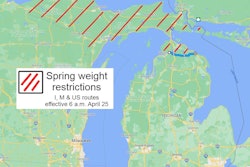The Federal Motor Carrier Safety Administration (FMCSA) last week said it would press forward with a rulemaking to require speed limiters on commercial trucks – an initiative that had been mostly dormant since early in the Trump administration.
Polling conducted by CCJ this week revealed that about 73% of respondents were already speed limited – nearly 23% up to 65 mph, 26.4% between 66 mph and 70 mph, and 23.4% above 70 mph, while 27.5% of respondents said they do not use speed limiters in their operations.
The agency issued a notice of intent to proceed with rulemaking that would pick up where a Sept. 7, 2016, joint proposal from FMCSA and National Highway Traffic Safety Administration (NHTSA) left off; requiring "vehicles with a GVWR of more than 26,000 pounds to be equipped with a speed limiting device set to a maximum speed to be specified in a final rule and would require motor carriers operating such vehicles in interstate commerce to maintain functional devices set to that speed for the service life of the vehicle (81 FR 61942)."
Specifically, NHTSA proposed to establish a new Federal Motor Vehicle Safety Standard (FMVSS) requiring each vehicle with a GVWR of more than 26,000 pounds, as manufactured and sold, to have its device set to a speed not greater than a specified speed and to be equipped with means of reading the vehicle’s current speed setting and the two previous speed settings (including the time and date the settings were changed) through its on-board diagnostic connection.
Neither the 2016 proposal nor last week's notice set a maximum speed. However, the Department of Transportation in 2016 appeared to be leaning toward 60 mph, 65 mph and 68 mph based on analysis on those speeds released within the rule at the time.
Reliance on the ECU
At the time the 2016 Notice of Proposed Rulemaking (NPRM) was published, NHTSA and FMCSA stated that all vehicles with electronic engine control units (ECUs) are generally electronically speed governed to prevent engine or other damage to the vehicle. Since the ECU monitors an engine’s RPM – from which vehicle speed can be calculated – it also controls the supply of fuel to the engine. Data collected by NHTSA at the time indicated that ECUs have been installed in most heavy trucks since 1999, save a few manufacturers that installed mechanical controls through 2003."Based on this background, it is likely the required means of achieving compliance with a speed limiter requirement would be to use the ECU to govern the speed of the vehicle rather than installing a mechanical means of doing so," FMCSA wrote in its notice last week.
The jurisdictional definitions of GVW and GVWR applicable to NHTSA regulations are slightly different from the FMCSA definitions applicable to the supplemental notice of proposed rulemaking, so in its April 2022 notice FMCSA cleared the deck of sorts, stating "this notice informs the public that FMCSA intends to move forward with a separate motor carrier-based speed limiter rulemaking. FMCSA believes that placing the requirement on motor carriers will ensure compliance with the rule, and potentially avoid confusion on who is responsible."
FMCSA said it intends to issue a supplemental notice of proposed rulemaking that would, if adopted, "impose speed limitations on certain CMVs subject to the FMCSRs. The rulemaking would propose that motor carriers operating certain commercial motor vehicles, as defined in 49 CFR 390.5, in interstate commerce that are equipped with an ECU capable of setting speed limits be required to limit the CMV to a speed to be determined by the rulemaking and to maintain that limit for the service life of the vehicle."
The agency said it is considering making the rule applicable to commercial trucks manufactured after a certain date – such as 2003 – since this population of vehicles would be equipped with ECUs that potentially could be used to govern the speed of the vehicles. FMCSA is also considering whether a retrofit requirement would be necessary.











